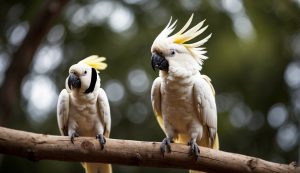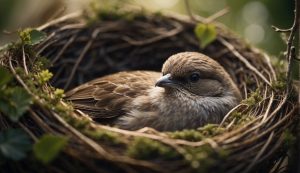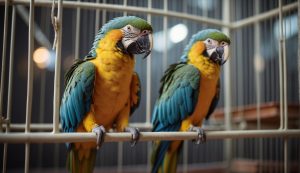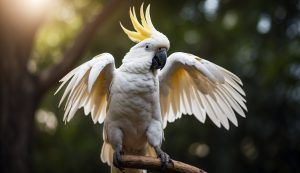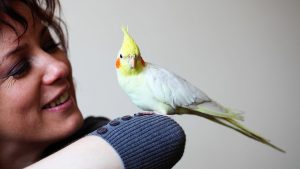Why Does My Bird Have Diarrhea? Understanding Avian Digestive Health

When I first noticed my bird displaying signs of diarrhea, it was concerning.
Diarrhea in birds can manifest as watery droppings or feces, which is not only uncomfortable for the pet but can also be indicative of underlying health issues.
As a proactive bird owner, it’s crucial to observe any changes in your bird’s droppings, as this can be an early warning sign of illness.
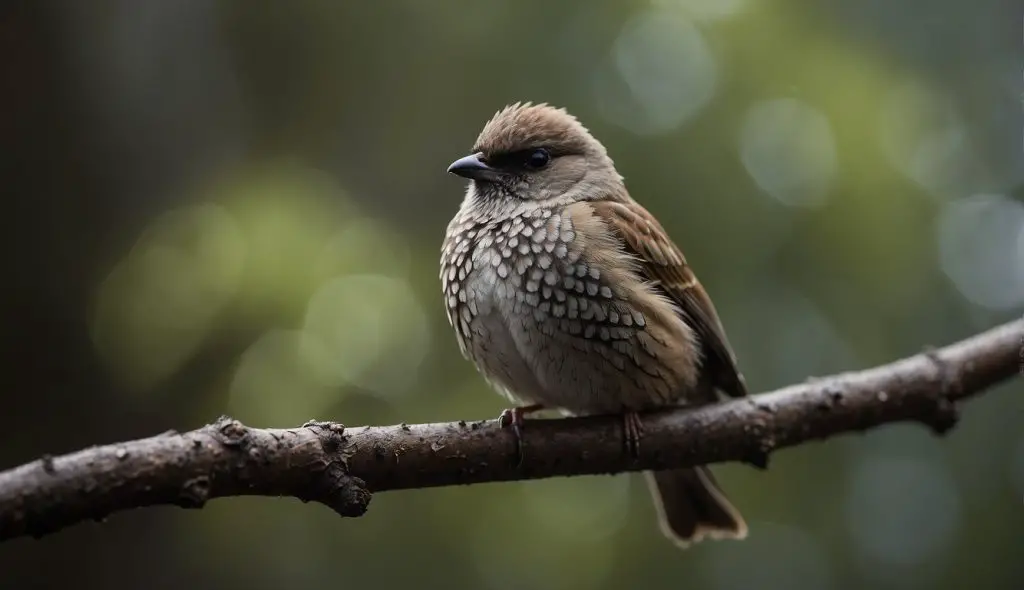
Understanding the potential causes of avian diarrhea is important for any bird owner. It could be something as simple as a change in diet or as complex as an infection or disease.
I learned that consulting an avian veterinarian is always the best course of action when you suspect your bird is ill. The vet can run various tests to diagnose the problem and recommend appropriate treatment options to aid in your bird’s recovery.
Key Points…
- Observing your bird’s droppings for changes can help catch health issues early.
- Avian diarrhea can be caused by various factors, from diet to disease, and warrants professional vet care.
- Regular consultation with an avian veterinarian helps ensure the long-term health and well-being of your pet bird.
Table of Contents
Recognizing Diarrhea in Birds
When my bird’s daily droppings deviate from their normal characteristics, it may be a sign of diarrhea. I’ll guide you through how to identify abnormal droppings and what changes in appearance and texture to look out for.
Identifying Abnormal Droppings
Normal bird droppings consist of three parts: a fecal portion (usually green or brown), a white urate portion, and clear liquid urine. I know something’s amiss when the balance among these components changes distinctly. For instance:
- Increased liquid: Significant increase in the watery part of the droppings
- Frequency: More droppings than usual could suggest diarrhea
- Volume: Larger droppings may indicate a problem
Changes in Appearance and Texture
While healthy droppings are solid with consistent texture, here are specific changes I might see if my bird has diarrhea:
| Consistency | Color Notes | Texture |
|---|---|---|
| Less solid | Green, brown, or unusual colors like black | Straying from typical firmness |
| Watery | May contain undigested food | Mucus-like appearance in droppings |
| Diffuse edges | White portion might appear less defined | Lack of defined shape or form |
Changes in the droppings’ consistency, color, or texture are warning signs. For example, if the droppings are consistently watery or the color shifts to a concerning black, which may indicate internal bleeding, it’s time for me to seek veterinary advice.
Possible Causes of Avian Diarrhea
When my feathered friends exhibit signs of diarrhea, it’s crucial for me to consider a range of potential causes. These can range from what they eat to various health issues and environmental stressors.
Dietary Factors
Diet is often a primary suspect when I notice diarrhea in birds. Birds have sensitive digestive systems, so any abrupt change in diet can cause trouble.
I make sure to introduce new foods like fresh fruits and vegetables gradually to prevent dietary upset. Overconsumption of certain foods, like those high in sugar or fat, can also lead to diarrhea.
It’s important for birds to have a balanced diet consisting mainly of high-quality pellets, fresh water, and a controlled amount of fruits and vegetables.
Infections and Parasites
Diarrhea in birds can often be a symptom of infections or parasites. Bacterial infections, such as colibacillosis, are common culprits.
Viral and fungal infections also account for some cases. Cryptosporidiosis, which is a parasitic infection, can cause persistent diarrhea in birds.
Protozoan parasites like Giardia, as well as worms and organisms causing chlamydiosis, are all possible pathogens that might cause a bird’s diarrhea.
Environmental and Stress Related Causes
The environment plays a key role in a bird’s health. Stress, induced by changes such as new surroundings or the addition of new pets or family members, can manifest as diarrhea.
I ensure that the living space is calm and stable to minimize stress levels in my birds.
Exposure to toxins is another environmental risk; birds are sensitive to heavy metal toxicity and other pollutants, which can affect their gastrointestinal health.
Sudden temperature changes or exposure to smoke and fumes can also disrupt their delicate system. If I suspect kidney disease—a condition influenced by both environment and stress—it might also present as diarrhea in birds.
Diagnostic Approach
When my bird shows signs of illness, I understand that a prompt and accurate diagnosis is crucial for their health. Below, I share my experience on when it’s necessary to consult a veterinarian and the common diagnostic tests they might use.
When to Seek Veterinary Attention
If I notice my bird is lethargic, has appetite changes, or experiences weight loss along with diarrhea, it’s time to consult an avian veterinarian.
Diarrhea can be a symptom of various conditions, so it’s important to monitor their overall health and not wait for the condition to worsen. If my bird’s condition is urgent, I make sure to seek immediate veterinary attention.
Common Diagnostic Tests
Once at the vet, I expect them to conduct a range of diagnostic tests to pinpoint the cause of my bird’s diarrhea. These tests include:
- Fecal Tests: To check for parasites, bacteria, or viral infections.
- Complete Blood Count (CBC): This test helps to reveal underlying infections or diseases affecting my bird’s immune system.
- Radiographs (X-rays):
- Purpose: To detect any abnormalities in the gastrointestinal tract or other organs.
- Process: My bird may need to be gently restrained to ensure clear images are obtained.
- Culture: Taking samples from the affected area to identify specific pathogens or sensitivities, especially if an infection is suspected.
Each of these tests provides vital information that helps the veterinarian make an informed diagnosis and tailor a treatment plan suitable for my bird.
Treatment Options and Recovery
When my bird developed diarrhea, I knew it was crucial to explore effective treatment options and carefully monitor its recovery process. Immediate veterinary attention was vital, as they could prescribe the right medications and guide me through supportive care and diet management.
Administering Medications
Medications: If the vet suspects a bacterial infection, they may prescribe antibiotics for my bird. I learn that it’s important to follow the dosage and schedule strictly to avoid resistance or relapse.
Supportive Care and Diet Management
- Hydration: Maintaining hydration is key. I offer fresh water and electrolyte solutions as recommended.
- Diet: Birds with diarrhea may need a diet adjustment. I introduce easily digestible foods and may incorporate probiotics to support gut health.
- Home Care: Alongside treatment, I provide a warm and stress-free environment to aid my bird’s recovery.
Monitoring Recovery
- Daily Checks: I monitor my bird for signs of improvement and watch out for any regurgitation or dehydration signs.
- Veterinary Visits: Regular follow-ups with the vet help ensure the recovery is on track, and adjust treatments as needed.
- Supportive Care: If I notice any changes, I promptly consult the vet for further supportive care advice.
Prevention and Long-Term Health
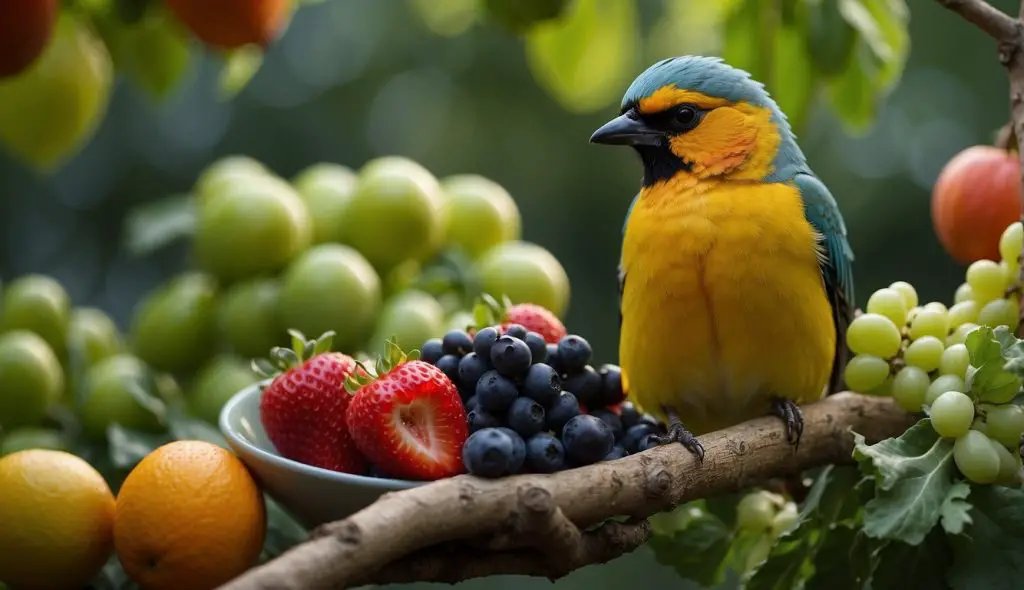
In my experience with companion birds such as lovebirds, cockatiels, and finches, ensuring their long-term health and preventing issues like diarrhea hinges on a few crucial aspects: a balanced diet, a stress-free environment, and regular veterinary checkups.
Diet and Nutrition
The cornerstone of preventing health issues in birds, including diarrhea, is a healthy diet. These are a few key components I focus on:
- Proper Nutrition: Each species has specific dietary needs. I always ensure they receive the right mix of seeds, pellets, and fresh foods.
- Clean Water: Fresh and clean water is a must for hydration and health. I change it daily to prevent contamination.
- Fruits and Vegetables: A variety of fruits and vegetables are essential, but it’s crucial to know which are safe for my bird. I typically avoid avocado, chocolate, and other known toxic foods.
Environmental Management
A bird’s living environment dramatically impacts its health. I make sure to manage these aspects:
- Clean Cage: I clean my bird’s cage regularly to reduce the risk of infections. This means weekly scrub downs and daily spot cleaning.
- Stress Reduction: Creating a routine and minimizing loud noises helps keep my birds stress-free, which is vital for their immune systems.
Routine Veterinary Care
Lastly, no prevention routine is complete without professional input:
- Routine Check-Ups: I schedule annual visits to an avian vet for wellness check-ups, which help catch and address potential health issues early on.
By focusing on a healthy diet, creating a stable and clean environment, and partnering with a veterinarian for regular care, I help ensure that my feathered friends enjoy a high quality of life, free of preventable issues such as diarrhea.
Understanding Avian Anatomy and Physiology
As we explore why birds may suffer from diarrhea, it’s crucial to have a grasp on their unique anatomical and physiological features which are quite different from mammals’.
Digestive System
Birds have a specialized digestive system that reflects the complexity of their dietary needs, which can often differ significantly from those of mammals. When I consider the anatomy of a bird, starting at the beak, food first enters the crop, which is a storage space where food can soften and begin the initial stage of digestion.
Moving down, the proventriculus acts as the glandular stomach where enzymes are released to chemically break down food. Following this is the ventriculus, or gizzard, a muscular part of the stomach that grinds food down physically, often with the aid of ingested grit.
As the food progresses, it reaches the small intestine, where most of the nutrients are absorbed. Birds have relatively shorter intestines compared to mammals, which is why their digestion is quite efficient. Next, undigested food components, along with waste products from the liver and kidneys, will move into the large intestine.
It’s important to note that birds do not have a urinary bladder. Instead, the kidneys excrete nitrogenous waste in the form of uric acid or urates, which are less toxic and conserve water better than urea. Urates are typically expelled along with feces to form the bird’s droppings.
Polyuria, which is an increase in urine, often manifests itself as watery feces and is one of the most common causes of diarrhea in birds. This might be due to a range of factors including infection, dietary problems, or other internal issues.
The presence of diarrhea in birds is an indication that their digestive process is disrupted, and understanding these unique anatomical aspects can be critical in identifying the underlying cause.
Frequently Asked Questions
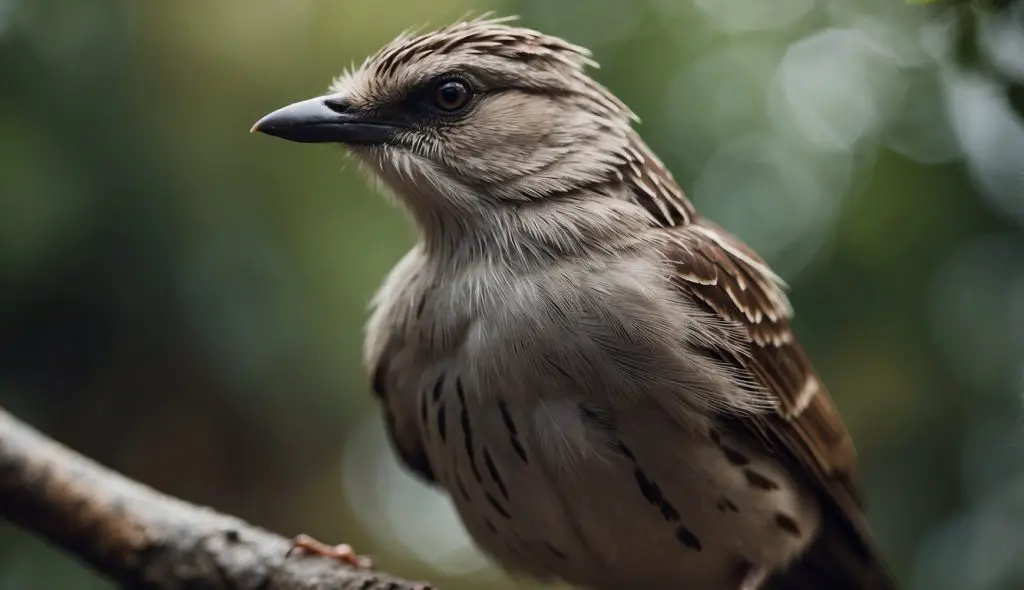
When my own birds showed signs of digestive trouble, I sought answers. Here, I share valuable information to help fellow bird owners understand and address diarrhea in their feathered friends.
What are some home remedies for treating bird diarrhea?
It is not recommended to treat bird diarrhea at home without consulting a veterinarian first. While some home remedies may provide temporary relief, they may not address the underlying cause of the diarrhea. Additionally, some remedies may even be harmful to your bird’s health.
How can I cure my budgie’s diarrhea?
The best course of action is to take your budgie to see a veterinarian. The vet can diagnose the cause of the diarrhea and recommend appropriate treatment.
In some cases, the vet may prescribe medication or recommend changes to your bird’s diet or environment.
What does unhealthy bird poop look like?
Unhealthy bird poop can vary depending on the underlying cause. However, it may appear watery or runny, have an unusual colour or consistency, or have a foul odour.
If you notice any changes in your bird’s droppings, it is important to consult a veterinarian.
Why does my cockatiel have runny poop?
There are several possible causes of runny poop in cockatiels, including infections, diet, stress, or a change in environment. A veterinarian can help diagnose the cause and recommend appropriate treatment.
Can parrots get diarrhea and how can it be treated?
Yes, parrots can get diarrhea. The treatment will depend on the underlying cause, which may include infections, parasites, diet, or stress. A veterinarian can help diagnose the cause and recommend appropriate treatment.
Are there any common causes of bird diarrhea?
There are several possible causes of bird diarrhea, including infections, parasites, diet, stress, or a change in environment. It is important to consult a veterinarian to diagnose the cause and recommend appropriate treatment.
Can a bird’s droppings indicate potential health issues?
Absolutely, droppings can be a window into a bird’s health. I’ve learned to look out for unusual colors, consistency, or frequency in their droppings, as these can be early indicators of health issues.
How can I treat my bird’s diarrhea at home?
I’ve found that gently and carefully adjusting my bird’s diet, ensuring they have clean water, and providing a stress-free environment can often help manage mild cases of diarrhea at home. However, I always recommend consulting with a vet if symptoms persist.
What are the symptoms of diarrhea in budgies?
In my experience, symptoms that indicate diarrhea in budgies include watery and frequent droppings, changes in droppings’ color, and a possible decrease in their overall energy and appetite.
What should healthy bird droppings look like?
Healthy bird droppings should consist of three parts: a firm, dark fecal portion, a white uric acid component, and a clear liquid urine. They typically shouldn’t be too watery or discolored.
What home remedies can help my parakeet with diarrhea?
For my parakeet, I’ve often used plain, cooked rice or pasta in small amounts as a home remedy. It’s essential to avoid overfeeding and to monitor their condition closely.
Is watery poop a sign of illness in birds?
Yes, watery poop can be a sign of illness in birds. It’s a symptom I watch out for, especially if it’s accompanied by changes in behavior or appearance. Swift veterinary attention is usually needed to rule out serious conditions.

